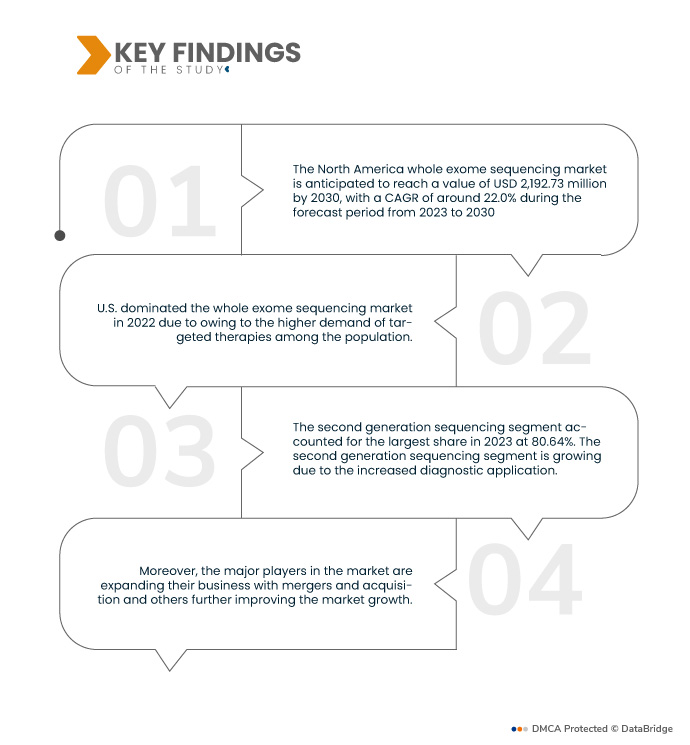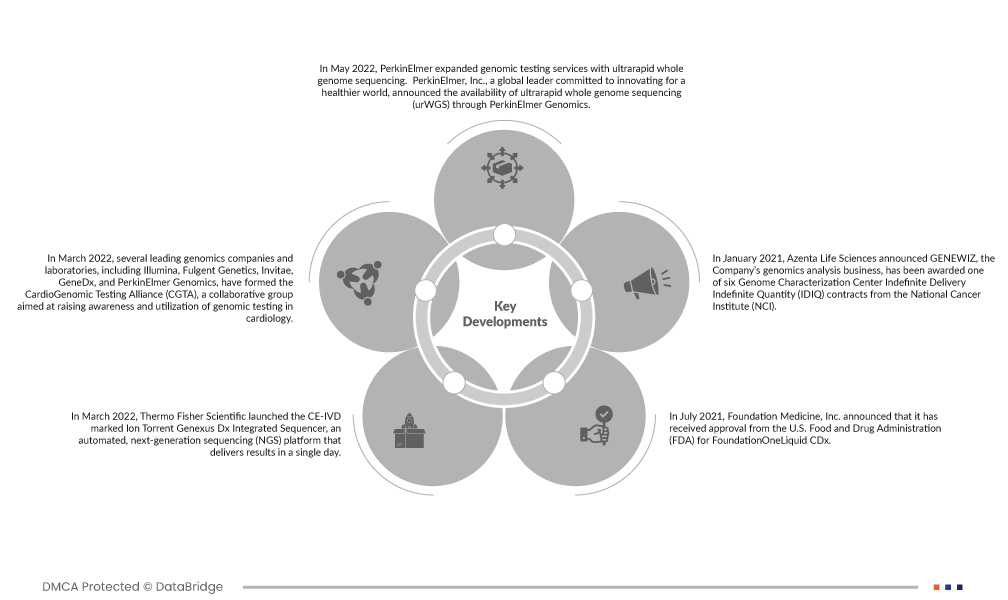Whole exome is a genomic technique for sequencing all of the protein-coding region of genes in a genome. Whole exome sequencing (WES) is available to patients who are searching for a unifying diagnosis for multiple medical conditions. A laboratory process that is used to determine the nucleotide sequence primarily of the exonic (or protein-coding) regions of an individual’s genome and related sequences, representing approximately 1% of the complete DNA sequence, also called WES. Whole-exome sequencing is a widely used whole exome sequencing (WES) method that involves sequencing the protein-coding regions of the genome. The human exome represents less than 2% of the genome, but contains ~85% of known disease-related variants,1 making this method a cost-effective alternative to whole-genome sequencing.
Access Full Report @ https://www.databridgemarketresearch.com/reports/north-america-whole-exome-sequencing-market
Data Bridge Market Research analyses that the Whole Exome Sequencing (WES) Market is expected to grow at a CAGR of 22.0% in the forecast period of 2023 to 2030 and is expected to reach USD 2,192.73 million by 2030. The second generation sequencing is projected to propel the growth of the market as they are widely used in diagnostic applications.
Key Findings of the Study
Growing usage of targeted sequencing methods
As genomics-focused pharmacology continues to play a greater role in the treatment of various chronic diseases, especially cancer, next-generation sequencing (NGS) is evolving as a powerful tool for providing a deeper and more precise insight into molecular underpinnings of individual tumors and specific receptors.
NGS offers advantages in accuracy, sensitivity, and speed compared to traditional methods that have the potential to make a significant impact on the field of oncology. Because NGS can assess multiple genes in a single assay, the need to order multiple tests to identify the causative mutation is eliminated.
Report Scope and Market Segmentation
|
Report Metric
|
Details
|
|
Forecast Period
|
2023 to 2030
|
|
Base Year
|
2022
|
|
Historic Years
|
2021 (Customizable to 2015 – 2020)
|
|
Quantitative Units
|
Revenue in USD Million
|
|
Segments Covered
|
Component (Whole Exome Sequencing, Second-Generation Sequencing, and Third-Generation Sequencing), Product and Services (Systems, Kits, and Services), Application (Diagnostics, Drug Discovery and Development, Personalized Medicine, Agriculture & Animal Research, and Others), End User (Hospitals & Clinics, Pharmaceutical & Biotechnology Companies, Academic & Research Institutes, Clinical Laboratories, and Others), Distribution Channel (Direct Trade, Retail Sales, and Others)
|
|
Countries Covered
|
U.S., Canada, and Mexico
|
|
Market Players Covered
|
Thermo Fisher Scientific Inc. (U.S.), QIAGEN (Netherlands), Illumina, Inc. (U.S.), Beckman Coulter, Inc. (U.S.), Eurofins Scientific (Luxembourg), ExoDx (a part of Bio-Techne) (U.S.), FOUNDATION MEDICINE, INC. (A subsidiary of F. Hoffmann-La Roche Ltd) (U.S.), GeneFirst Limited (U.S.), Meridian (U.S.), Merck KGaA (Germany), SOPHiA GENETICS (U.S.), Azenta U.S. Inc. (U.S.), CD Genomics (U.S.), Twist Bioscience (U.S.), PerkinElmer Genomics (A Subsidiary of PerkinElmer Inc.) (U.S.), GeneDx, LLC (U.S.), Psomagen (U.S.), and Integrated DNA Technologies, Inc. (U.S.) among others.
|
|
Data Points Covered in the Report
|
In addition to the insights on market scenarios such as market value, growth rate, segmentation, geographical coverage, and major players, the market reports curated by the Data Bridge Market Research also include depth expert analysis, patient epidemiology, pipeline analysis, pricing analysis, and regulatory framework.
|
Segment Analysis:
The North America whole exome sequencing market is segmented based on component, product and service, application, end-user, and distribution channel.
- On the basis of component, the North America whole exome sequencing (WES) market is segmented second-generation sequencing and third-generation sequencing
In 2023, the second-generation sequencing segment of the component segment is expected to dominate the market
In 2023, the second-generation sequencing segment is expected to dominate the market with a market share of 80.64% as it is the major component in whole exome sequencing procedures.
- On the basis of product and service, the North America whole exome sequencing (WES) market is segmented into systems, kits, and services
In 2023, the systems segment of the product and service segment is expected to dominate the market
In 2023, the systems segment is expected to dominate the market with a 47.76% market share due to the technological advancements in sequencing systems.
- On the basis of application, the North America whole exome sequencing (WES) market is segmented into drug discovery and development, agriculture & animal research, diagnostics, personalized medicine, and others. In 2023, the drug discovery and development segment is expected to dominate the market with a 35.02% market share
- On the basis of end user, the North America whole exome sequencing (WES) market is segmented into pharmaceutical & biotechnology companies, academic & research institutes, hospitals, clinical laboratories, and others. In 2023, the pharmaceutical & biotechnology companies segment is expected to dominate the market with 43.54% market share
- On the basis of distribution channel, the North America whole exome sequencing (WES) market is segmented into direct trade, retail sales, and others. In 2023, the direct trade segment is expected to dominate the market with a 57.20% market share
Major Players
Data Bridge Market Research recognizes the following companies as the major whole exome sequencing (WES) market players in whole exome sequencing (WES) market are Thermo Fisher Scientific Inc. (U.S.), QIAGEN (Netherlands), Illumina, Inc. (U.S.), Beckman Coulter, Inc. (U.S.), Eurofins Scientific (Luxembourg), among others.
Market Development
- In May 2022, PerkinElmer expanded genomic testing services with ultrarapid whole genome sequencing. PerkinElmer, Inc., a global leader committed to innovating for a healthier world, announced the availability of ultrarapid whole genome sequencing (urWGS) through PerkinElmer Genomics. This addition to the Company’s portfolio of whole genome sequencing (WGS) offerings provided physicians with comprehensive, meaningful results in five days to help inform clinical management and improve outcomes for critically ill patients in neonatal and pediatric intensive care units. This has helped the company to proceed further with research in the genomics division
- In March 2022, several leading genomics companies and laboratories, including Illumina, Fulgent Genetics, Invitae, GeneDx, and PerkinElmer Genomics, have formed the CardioGenomic Testing Alliance (CGTA), a collaborative group aimed at raising awareness and utilization of genomic testing in cardiology. CGTA seeks to educate healthcare providers and other stakeholders about the value of such testing to assure adherence to existing guidelines from professional medical societies, to inform medical management and cascade testing, and to improve clinical outcomes. This has helped the company to adhere to guidelines
- In March 2022, Thermo Fisher Scientific launched the CE-IVD marked Ion Torrent Genexus Dx Integrated Sequencer, an automated, next-generation sequencing (NGS) platform that delivers results in a single day. It is designed for use in clinical laboratories, the fully validated system enables users to perform both diagnostic testing and clinical research on a single instrument. This has helped the company to make advancements in its product portfolio
- In July 2021, Foundation Medicine, Inc. announced that it had received approval from the U.S. Food and Drug Administration (FDA) for FoundationOneLiquid CDx to be used as a companion diagnostic to aid in identifying patients with MET exon 14 skippings (METex14) in metastatic non-small cell lung cancer (NSCLC) for whom treatment with TABRECTA (capmatinib) may be appropriate. This has helped the company to expand its portfolio
- In January 2021, Azenta Life Sciences announced that GENEWIZ, the Company’s genomics analysis business, has been awarded one of six Genome Characterization Center Indefinite Delivery Indefinite Quantity (IDIQ) contracts from the National Cancer Institute (NCI). The NCI, the nation’s leader in cancer research and part of the National Institutes of Health (NIH), chose GENEWIZ to provide whole-exome sequencing to new research projects at its Center for Cancer Genomics for three years. This helped the company to focus on genome sequencing
Regional Analysis
Geographically, the countries covered in the whole exome sequencing market report are U.S., Canada and Mexico.
As per Data Bridge Market Research analysis:
U.S. is the dominant and fastest-growing country in the whole exome sequencing market during the forecast period 2023 - 2030
The U.S. is expected to dominate the whole exome sequencing market owing to the higher demand for targeted therapies among the population and various industries. This is also due to the growing demand for WES technology in the new applications.
For more detailed information about the Europe micro invasive glaucoma surgery (MIGS) devices market report, click here – https://www.databridgemarketresearch.com/reports/north-america-whole-exome-sequencing-market












